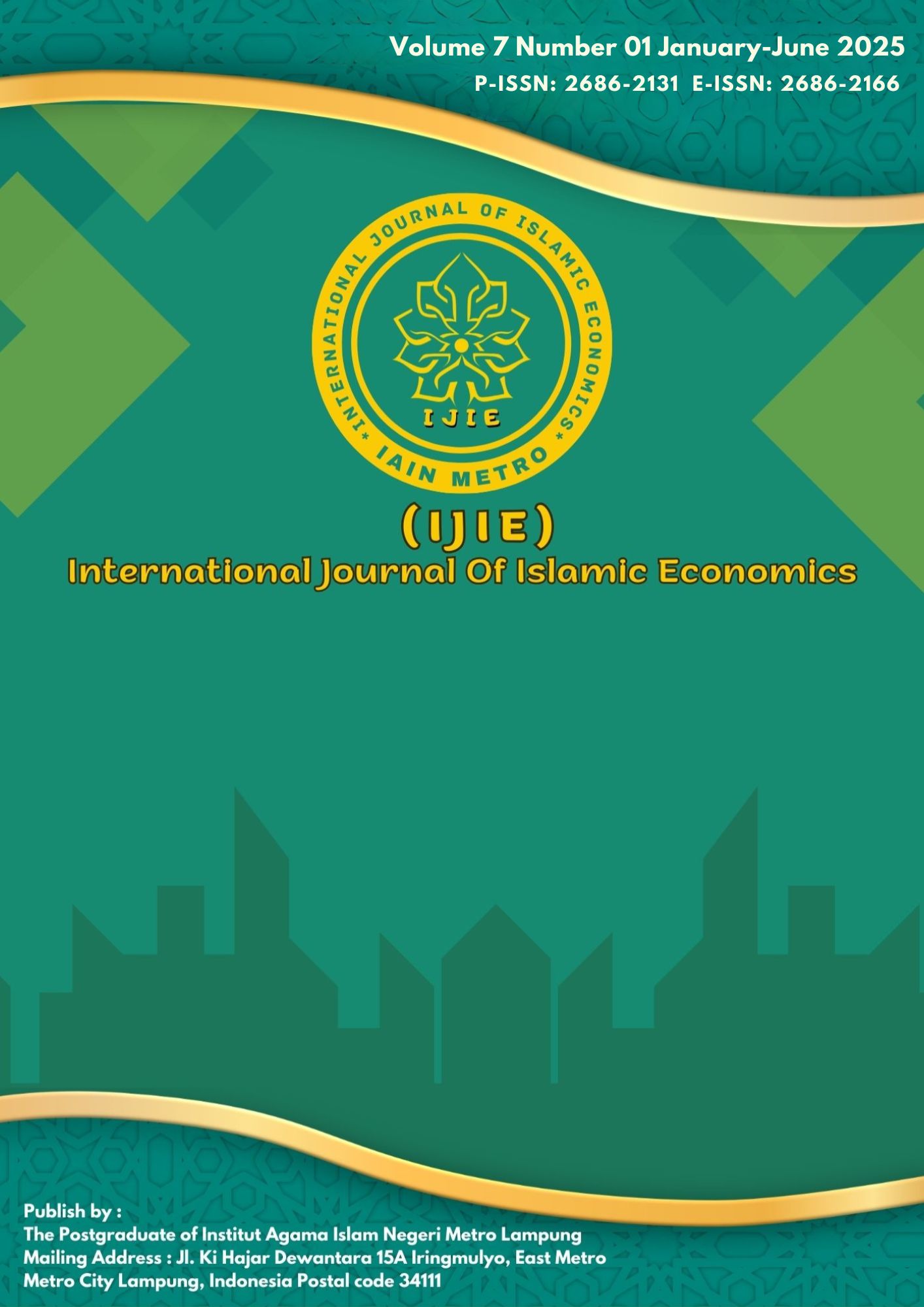Islamic Economic Perspectives on Global Economic Integration: A Theoretical Framework
DOI:
https://doi.org/10.32332/ijie.v7i01.10302Keywords:
Global Trade; Halal Product Guarantee Law; World Trade Organization Agreement.Abstract
Introduction: Globalization certainly has a significant impact on the lives of Indonesian people. This impact includes two aspects, namely positive and negative. The influence of globalization has also penetrated all areas of life, including politics, economics, thought, and socio-cultural life. With its concept of Sharia economics, Islam is present at the right time and is warmly welcomed by the community. Islamic economics seems to be at least considered an alternative answer to the chaos of economic globalization. Objective: This study examines whether Islamic Economics can be an alternative answer to the increasingly complex chaos of economic globalization. Method: This study uses Library Research, commonly called a literature review. The data is obtained from various related literature, which is classified and analysed using a critical philosophical approach. Result: The results show that the concept of Islamic economics aims to achieve Maqasid Shari'ah, which includes the fulfilment of five basic needs (al-ḍaruriyat al-khams), namely the protection of religion, soul, mind, offspring, and property. To achieve this goal, steps that need to be taken include revitalization of the human element, reduction of wealth concentration, economic restructuring, and fiscal restructuring. Implication: This research provides an understanding that Islamic economics has the potential to be an effective alternative in dealing with the inequalities and challenges posed by the global economy.
Downloads
References
Abdin, M. J. (2017). Challenges of Global Economic Integration. SSRN Electronic Journal. https://doi.org/10.2139/ssrn.2909413
Amanat, A. (2021). The Global Islamic Revolution. In Revolutionary World (pp. 192–214). Cambridge University Press. https://doi.org/10.1017/9781108182409.009
Awais, M., Osman Öztürk, A., Khalid Bhatti, O., & Ellahi, N. (2024). The Islamic Economic System. Routledge. https://doi.org/10.4324/9781003484349
Cortelezzi, F., & Ferrari, A. (2022). Contemporary Issues in Islamic Law, Economics and Finance. Routledge. https://doi.org/10.4324/9781003155218
Hanif, M., Chaker, M., & Sabah, A. (2024). Islamic finance and economic growth: Global evidence. Digest of Middle East Studies, 33(1), 83–102. https://doi.org/10.1111/DOME.12313
Jam’an, Asdar, & Marsuni, N. S. (2024). The Challenges of the Sharia Economy and Businesses In Facing the Coronavirus Endemic and Circular Economy In Indonesia. LAA MAISYIR : Jurnal Ekonomi Islam, 275–291. https://doi.org/10.24252/LAMAISYIR.V11I2.48593
Kassim, S. (2016). Islamic finance and economic growth: The Malaysian experience. Global Finance Journal, 30, 66–76. https://doi.org/10.1016/j.gfj.2015.11.007
Kuanova, L. A., Sagiyeva, R., & Shirazi, N. S. (2021). Islamic social finance: a literature review and future research directions. Journal of Islamic Accounting and Business Research, 12(5), 707–728. https://doi.org/10.1108/JIABR-11-2020-0356
Mashdurohatun, A. (2011). Tantangan Ekonomi Syariah Dalam Menghadapi Masa Depan Indonesia Di Era Globalisasi. Jurnal Dinamika Hukum, 11(0), 76–88. https://doi.org/10.20884/1.JDH.2011.11.EDSUS.264
Mohamed, H. (2021). Decentralizing Finance via Cryptocurrencies and Tokenization of Assets and Peer-to-Peer Platforms. International Journal of Islamic Economics, 3(01), 1–16. https://doi.org/10.32332/IJIE.V3I1.3128
Muala, A. (2020). Reposisi Ekonomi Islam Di Era Globalisasi Perspektif Maqashid Syari’ah. JIL: Journal of Islamic Law, 1(1), 45–63. https://doi.org/10.24260/jil.v1i1.17
Nisa, H., Khotimah, I. C., Hidayani, & Ahmadan, D. (2024). Keuangan Syariah dalam Menghadapi Resesi Global. ADL ISLAMIC ECONOMIC Nisa, H., Khotimah, I. C., Hidayani, & Ahmadan, D. (2024). Keuangan Syariah Dalam Menghadapi Resesi Global. Adl Islamic Economic, 5(1), 23–33.. https://doi.org/10.56644/ADL.V5I1.101
Safri, H. (2019). Globalisasi Ekonomi dalam Perspektif Islam. Ecobisma (Jurnal Ekonomi, Bisnis Dan Manajemen), 5(1), 84–98. https://doi.org/10.36987/ecobi.v5i1.77
Singh, D., & Gal, Z. (2020). Economic Freedom and its Impact on Foreign Direct Investment: Global Overview. Review of Economic Perspectives, 20(1), 73–90. https://doi.org/10.2478/revecp-2020-0004
Triwibowo, A., Sugeng, A., & Baidhowi, M. M. (2023). Tax incentives during the COVID-19 pandemic: An Islamic economics perspective. Journal of Islamic Economics Lariba, 9(1), 149–164. https://doi.org/10.20885/JIELARIBA.VOL9.ISS1.ART9
Yuniarti, D. (2021). Globalisasi Ekonomi dan Moneter Syariah di Regional Asean: Perspektif Politik Ekonomi Islam. Cross-Border, 4(1), 605–628. https://journal.iaisambas.ac.id/index.php/Cross-Border/article/view/925
Downloads
Published
Issue
Section
License
Copyright (c) 2025 Nurul Wulandari Putri, Anton Satria Prabuwono

This work is licensed under a Creative Commons Attribution-ShareAlike 4.0 International License.









